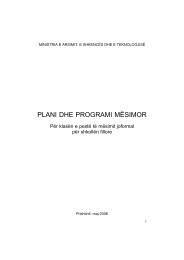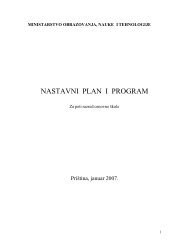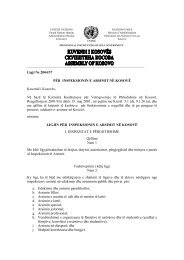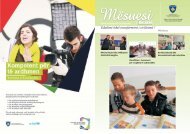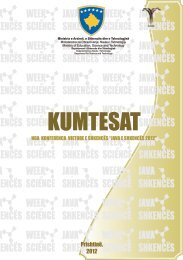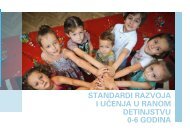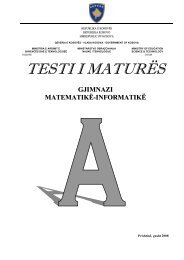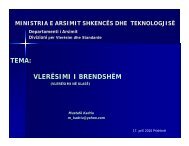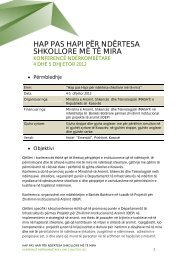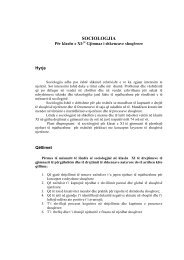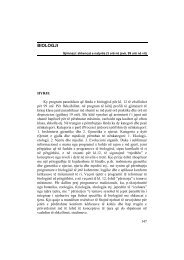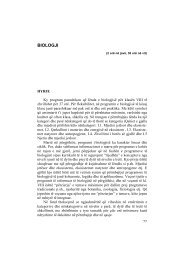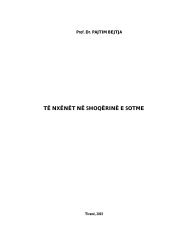Humboldt Kosmos 90/2007: Wissen schafft Entwicklung
Humboldt Kosmos 90/2007: Wissen schafft Entwicklung
Humboldt Kosmos 90/2007: Wissen schafft Entwicklung
Erfolgreiche ePaper selbst erstellen
Machen Sie aus Ihren PDF Publikationen ein blätterbares Flipbook mit unserer einzigartigen Google optimierten e-Paper Software.
<strong>Wissen</strong> <strong>schafft</strong> <strong>Entwicklung</strong> | || From Knowledge to Development <strong>Wissen</strong> <strong>schafft</strong> <strong>Entwicklung</strong> | || From Knowledge to Development<br />
Oscar Aguirre, Forstwissenschaftler aus Mexiko | ||<br />
Oscar Aguirre, forestry scientist from Mexico<br />
die geometrische Berechnung von neuen Produkt-Designs verbessern<br />
und die <strong>Entwicklung</strong> bis zum fertigen Produkt deutlich<br />
beschleunigen. „Mich reizt es, eine Idee in die Realität umzusetzen.<br />
Es ist eine wertvolle Erfahrung, einen Know-how-Transfer in<br />
<strong>Entwicklung</strong>sländer zu ermöglichen und zum gesellschaftlichen<br />
Fortschritt beizutragen“, sagt die Ingenieurin.<br />
Zur Stärkung der wissenschaftlichen Situation im Heimatland<br />
trägt auch das neu entwickelte Rückkehrstipendium bei, das die<br />
Georg Forster-Stipendiaten unmittelbar nach dem Ende ihres<br />
Deutschlandaufenthalts bei der Reintegration unterstützt und<br />
so einem Braindrain aus den <strong>Entwicklung</strong>sländern entgegenwirkt.<br />
Schließlich bedeutet <strong>Wissen</strong>schaftleraustausch im <strong>Humboldt</strong>-Netz<br />
keine Einbahnstraße nach Deutschland, sondern<br />
die Zusammenarbeit in einer Gemeinschaft hoch qualifizierter<br />
und mobiler <strong>Wissen</strong>schaftler, die in ihren jeweiligen Heimatländern<br />
erfolgreich Karriere machen. Der Biologe Hamadi Boga<br />
aus Kenia ist hierfür ein Beispiel. Er forschte zwischen 2005 und<br />
2006 als Georg Forster-Stipendiat am Max-Planck-Institut für<br />
terrestrische Mikrobiologie in Marburg. Er isolierte und charakterisierte<br />
Mikroorganismen im Darm von Termiten, um ihre<br />
Abbaufähigkeit von Schadstoffen zu prüfen mit dem Ziel, die<br />
Mikroorganismen als neue Quelle für Antibiotika und Enzyme<br />
zu nutzen. Der besondere Vorteil, ein <strong>Humboldt</strong>ianer zu sein,<br />
ergibt sich für Hamadi Boga aus dem vielfältigen Angebot für<br />
Alumni: „Das Besondere bei der <strong>Humboldt</strong>-Stiftung ist, dass die<br />
Förderung nach dem Deutschlandaufenthalt nicht einfach endet,<br />
sondern sich der eigentliche Mehrwert erst später ergibt. Der<br />
Weg zurück in mein Heimatland wurde mir durch ein einjähriges<br />
Rückkehrstipendium wesentlich erleichtert. Auf diese Weise<br />
konnte ich die in Deutschland begonnenen Forschungen fortsetzen<br />
und eine eigene Arbeitsgruppe an meinem Heimatinstitut<br />
aufbauen. Durch zusätzliche Hilfen zur Anschaffung von wissen-<br />
Bernadetta Kwintiana Ane, Ingenieurin aus Indonesien | ||<br />
Bernadetta Kwintiana Ane, engineer from Indonesia<br />
turning ideas into reality. It’s a valuable experience to facilitate the<br />
transfer of know-how to developing countries and contribute to<br />
social progress,” the engineer comments.<br />
Strengthening the academic situation at home is one of the<br />
effects of the new Return Fellowships which provide support<br />
for Georg Forster Fellows when their stay in Germany has come<br />
to an end. Facilitating their reintegration at home helps to prevent<br />
the braindrain from developing countries. After all, the<br />
exchange of academics in the <strong>Humboldt</strong> Network is not supposed<br />
to be a oneway street to Germany, but cooperation in a community<br />
of highly qualified and mobile academics who have made<br />
success ful careers for themselves in their respective countries.<br />
Who Was georg Forster?<br />
Georg Forster, a friend of Alexander von <strong>Humboldt</strong>, was<br />
a naturalist, travel writer and journalist. He was born near<br />
Gdansk in 1754 and, even as a child, spoke German, English,<br />
French and Russian. At 13, he moved to England with his<br />
father where he translated Mikhail Lomonosov’s “Short History<br />
of Russia” into English. From then on, he was known<br />
as the German “wunderkind”. In 1772, Georg Forster took<br />
part in James Cook’s second journey around the world and<br />
became famous in Europe after publishing his experiences of<br />
the journey in “A Voyage around the World”. In the following<br />
years, he was a professor at various different German universities<br />
and in 1787 accepted the post of librarian at Mainz<br />
University. Georg Forster became a supporter of the French<br />
Revolution in the 17<strong>90</strong>s, was forced to leave Germany for<br />
political reasons and died in Paris in 1794.<br />
Hamadi Boga, Biologe aus Kenia | ||<br />
Hamadi Boga, biologist from Kenya<br />
schaftlichen Geräten und Fachliteratur konnte ich außerdem die<br />
Ausstattung unseres molekularbiologischen Labors verbessern.“<br />
Für Hamadi Boga war das Georg Forster-Forschungsstipendium<br />
ein entscheidender Karriereschritt. Er ist jetzt Dekan der Fakultät<br />
für Naturwissenschaften an der Jomo Kenyatta Universität für<br />
Agrarwissenschaft und Technologie in Nairobi.<br />
Für die Chemikerin Leena Suntornsuk aus Thailand war vor allem<br />
das positive Umfeld in Deutschland beeindruckend. Von 2006 bis<br />
<strong>2007</strong> arbeitete sie als Georg Forster-Forschungsstipendiatin am<br />
Institut für Instrumentelle Analytik und Bioanalytik der Univer-<br />
Wer War georg Forster?<br />
Georg Forster, ein Freund Alexander von <strong>Humboldt</strong>s, war<br />
Naturforscher, Reiseschriftsteller und Journalist. Er wurde<br />
1754 bei Danzig geboren und sprach schon als Kind deutsch,<br />
englisch, französisch und russisch. Mit 13 Jahren siedelte er<br />
mit seinem Vater nach England über, wo er die „Kurze russische<br />
Geschichte“ von Michail Lomonossow aus der russischen<br />
in die englische Sprache übersetzte. Fortan galt er als<br />
deutsches „Wunderkind“. 1772 nahm Georg Forster an der<br />
zweiten Erdumsegelung von James Cook teil. Die auf dieser<br />
Reise gesammelten Erfahrungen veröffentlichte er unter<br />
dem Titel „A voyage round the world“ und wurde damit in<br />
Europa berühmt. In den Folgejahren war er Professor an verschiedenen<br />
deutschen Universitäten. 1787 nahm er die Stelle<br />
des Bibliothekars der Universität Mainz an. In den 17<strong>90</strong>er<br />
Jahren schloss sich Georg Forster der französischen Revolution<br />
an, musste Deutschland aus politischen Gründen verlassen<br />
und starb 1794 in Paris.<br />
Biologist Hamadi Boga from Kenya is a good example. From 2005<br />
to 2006, he was a Georg Forster Fellow at the Max Planck Institute<br />
for Terrestrial Microbiology in Marburg. He isolated and characterised<br />
microorganisms in the intestines of termites to examine<br />
their ability to break down harmful substances with the object<br />
of tapping the microorganisms as a new source of antibiotics<br />
and enzymes. According to Hamadi Boga, the particular advantage<br />
of being an <strong>Humboldt</strong>ian is the range of offers available to<br />
alumni. “What is special about the <strong>Humboldt</strong> Foundation is that<br />
their sponsorship doesn’t simply stop when your stay in Germany<br />
comes to an end – the real added value comes later. My return<br />
home was made much easier for me because I had a Return Fellowship<br />
for a year. It meant I could continue the research I had<br />
started in Germany and build up a working group at my own institute.<br />
Then there were other grants for buying scientific equipment<br />
and specialist literature so that I could improve the facilities in our<br />
molecular biology lab.” In Hamadi Boga’s case, the Georg Forster<br />
Fellowship was a decisive step in his career. He is now Dean of the<br />
Faculty of Science at Jomo Kenyatta University of Agriculture and<br />
Technology in Nairobi.<br />
Chemist Leena Suntornsuk from Thailand was particularly<br />
impressed by how positive her environment was in Germany.<br />
From 2006 to <strong>2007</strong>, she worked as a Georg Forster Research Fellow<br />
at the Institute of Instrumental Analysis and Bioanalysis at<br />
Saarland University. The feeling of belonging to the worldwide<br />
<strong>Humboldt</strong> Family made her feel safe and confident from the very<br />
beginning. “My stay in Germany was a great experience and did a<br />
lot for me scientifically and personally. Because of being an <strong>Humboldt</strong>ian<br />
and a Georg Forster Fellow, I never felt far from home,<br />
despite my new surroundings, the new language and lots of other<br />
new things,” she says looking back.<br />
The most important consideration for many research fellows and<br />
10 <strong>Humboldt</strong> kosmos Sonderausgabe 2008<br />
11



